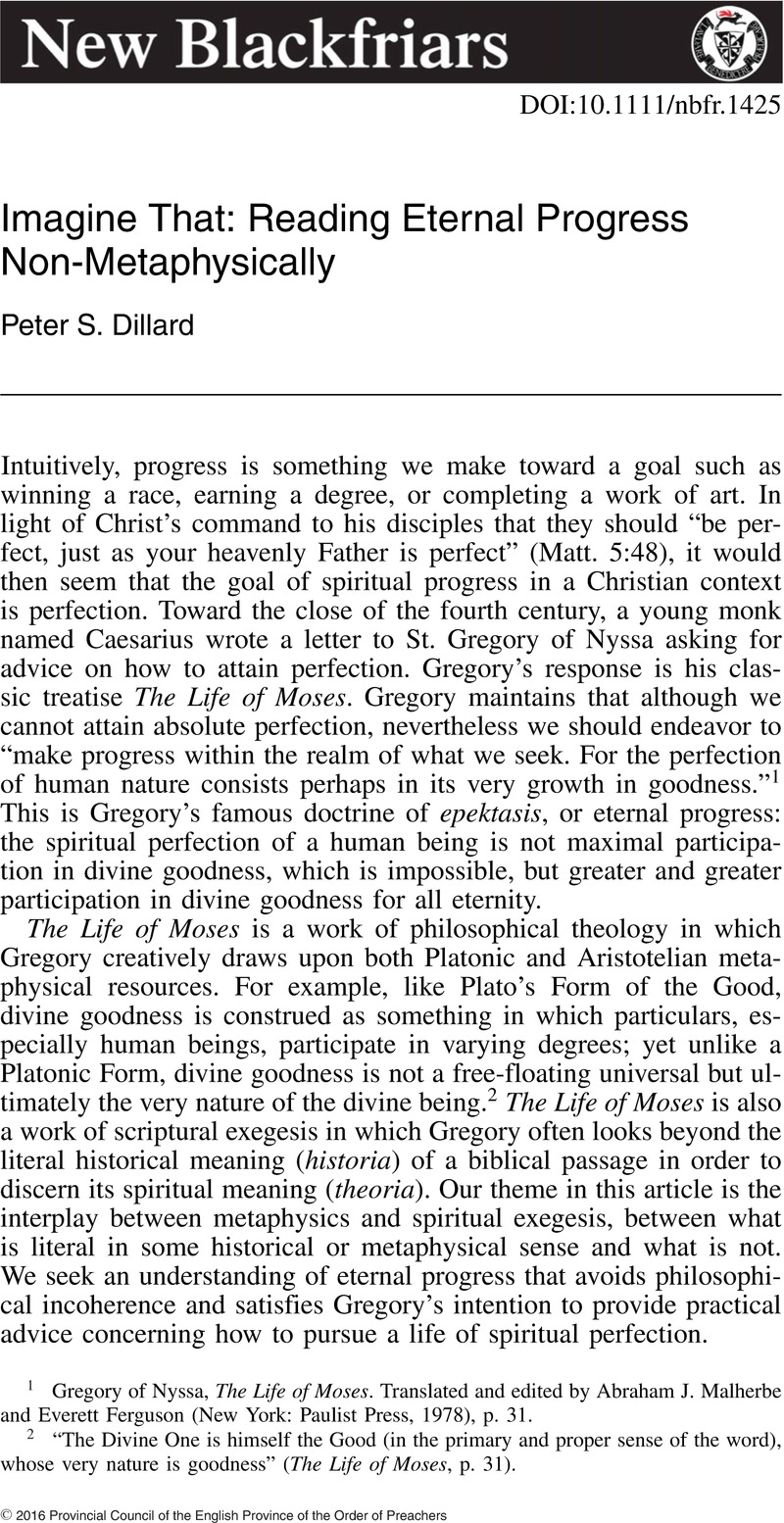No CrossRef data available.
Article contents
Imagine That: Reading Eternal Progress Non‐Metaphysically
Published online by Cambridge University Press: 01 January 2024
Abstract

- Type
- Original Article
- Information
- Copyright
- Copyright © 2016 Provincial Council of the English Province of the Order of Preachers
References
1 Gregory of Nyssa, The Life of Moses. Translated and edited by Malherbe, Abraham J. and Ferguson, Everett (New York: Paulist Press, 1978), p. 31Google Scholar.
2 “The Divine One is himself the Good (in the primary and proper sense of the word), whose very nature is goodness” (The Life of Moses, p. 31).
3 Ibid., p. 30.
4 Ibid., p. 31.
5 Ibid.
6 St. Bonaventure makes the same point in In 1 Sent., dist. 1, a.3, q.2, ad.2: ‘it must be said that it [the soul] captures the infinite Good in a finite manner, since it is itself finite. But since that Good is infinite, for that reason it is totally absorbed by It, so that its capacity is already terminated on all sides’ (p. 41). An English translation (2007) by Br. Alexis Bugnolo can be found in the online Franciscan Archive at http://www.franciscan‐archive.org/bonaventura/opera/bon01039.html.
7 The Life of Moses, p. 95. By “knowledge” here, Gregory means “direct knowledge.”
8 The Life of Moses, p. 67.
9 Ibid., p. 68.
10 See, respectively, ibid., pp. 59–63; pp. 94–97; and pp. 97–101.
11 For Gregory's definition of falsehood see ibid., p. 60.
12 See ibid.
13 There is another discrepancy between the space traveler case and eternal progress, in that there is no increase in the space traveler's basic capacity to see; whereas, according to Gregory, there is an increase in the contemplative's capacity to participate in divine goodness. We shall return to this issue below.
14 Ibid., p. 95.
15 Ibid., p. 97.
16 Ibid., p. 96.
17 See ibid., pp. 99–100.
18 Ibid., p. 98.
19 Gregory thinks that supernaturally learned rational principles provide us with divine names and predicates “in accord with a significance fitting to God” (ibid., p. 99) which describe not God's essence but God's power. In our example, the rule we teach the native about traffic lights provides her with names and predicates describing not the phenomenal character of red and green but their operations: “(is a) signal requiring vehicles to stop,” “(is a) signal permitting vehicles to proceed,” respectively. For Gregory, the tabernacle as the totality of rational principles structuring and upholding the universe provides us with divine names and predicates applicable to Christ as the eternal Word: “(is the) eternal tabernacle,” “(is the) pillar of strength,” “(is the) throne of judgment,” and so forth (see ibid, p. 118).
20 Ibid., p. 113.
21 For example, see De anima et resurrectione in Patrologia graeca. Edited by Migne, J.P. (Paris: Migne, 1857—1866)Google Scholar, 46.105 A–C.
22 Gregory affirms the immortality of the soul in The Life of Moses, p. 63: “For example, pagan philosophy says that the soul is immortal. This is pious offspring.” See also De anima et resurrection 46.45C–48C and 52A. We do not evaluate but merely note the argument that the soul is immortal because it is indecomposable.
23 One might propose an understanding of numerical infinity along the lines of mathematical intuitionism: the series 2,4,6,8, etc. is not literally infinite but only potentially so in that we human beings possess the capacity to keep adding 2. Accordingly, the soul is not literally infinite but only potentially so in that it possesses a capacity to participate more and more in divine goodness. But this characterization is patently question‐begging, for the soul's alleged capacity to participate more and more in divine goodness is the very “capacity” we are trying to understand.
24 Wittgenstein, Ludwig, Philosophical Investigations. Translated by Anscombe, G.E.M. (New York: Macmillan Publishing Co., 1968), section 127, p. 50Google Scholar.
25 Ibid., p. 178.
26 See The Life of Moses, pp. 72–73.
27 See ibid., pp. 75–76.
28 See ibid., p. 81.
29 For example, see section 10 of Ecce Homo: “My formula for greatness in a human being is amor fati: that one wants nothing to be different, not forward, not backward, not in all eternity.” In Basic Writings of Nietzsche. Translated by Kaufmann, Walter (New York: Random House, 2000), p. 714Google Scholar.
30 The Life of Moses, p. 133.
31 Ibid., p. 134.
32 See ibid., pp. 125–126.
33 See ibid., pp. 128–129.
34 Ibid., p. 128.
35 To employ a different idiom, the discrepancy between the status of his behavior for others and the status of his behavior for him can be said to be a way in which his willing is disordered.
36 Ibid., p. 121.
37 There is a connection between Gregory's understanding of virtue as something under one's control and Augustine's idea of evil as “the love of those things which a man can lose against his will.” See On Free Choice of the Will. Translated by Benjamin, Anna S. and Hackstaff, L.H. (New York: Macmillan Publishing Company, 1964), p. 10Google Scholar.
38 Even if they make use of some concepts with experiential content—such as bodily desires, neighbor, fortune, and misfortune—the tests we have described utilize imaginative rational arguments rather than appeals to sensory experience: thought experiments, not empirical ones.
39 The Life of Moses, p. 93.
40 Ibid., p. 64. Also see ibid., pp. 118–120, where Gregory spiritually interprets Moses’ seeing the back of God as the need to follow Christ as the guide who is able to lead us where we cannot lead ourselves.
41 Ibid., p. 136, emphasis added.




